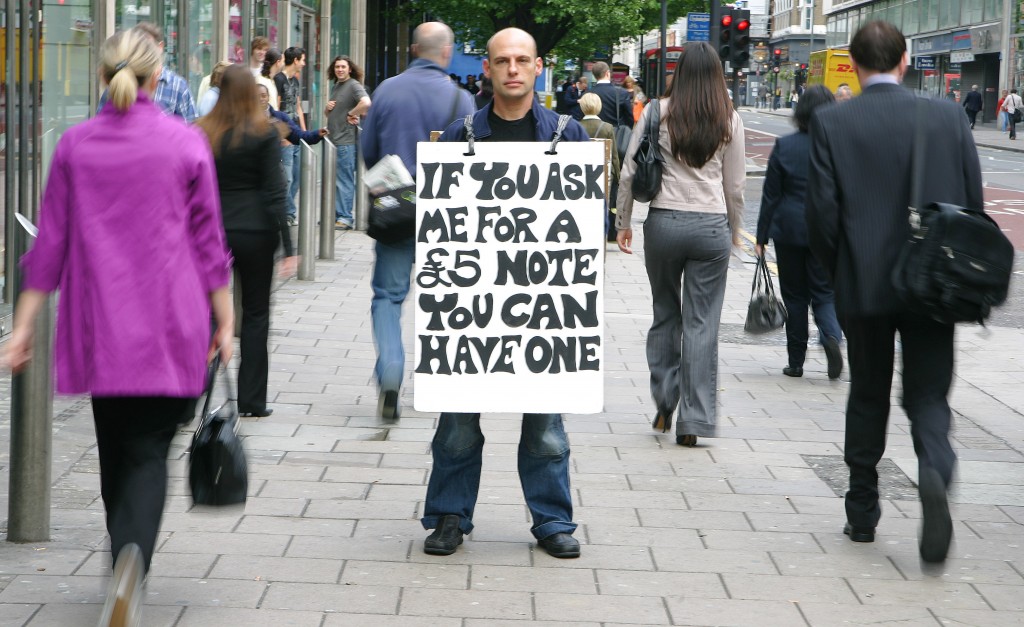There’s this amazing scam going on in our society, perpetrated by private industry, no less. And get this – it’s backfiring. The people behind the scam are the ones getting taken advantage of. If you’ve ever cheered for an underdog against a Goliath, this is the ultimate comeuppance story. You’re not going to believe how this works:
The scammers act as an intermediary between you as a consumer, and whichever merchant you’re buying from. They take your money – well, even that’s not accurate. It’s not like they put it in an escrow account or anything. They actually front you the money to buy whatever it is you want, and then you pay them anytime you want in the next month. Given the time value of money, that means the scammers are losing on the deal. As for the merchants, they love this arrangement because as part of the front, the scammers pay out of their own pockets immediately. You could skip the country, die, or ring up debts all around town and the merchants wouldn’t care. They still get paid. And you can do this over and over again. As fast as you can shop, the scammers will be there, ready to front you whatever you want. Some of them will front you $6,000 out of the gate, others $15,000 or so, and still others don’t even set a maximum.
Okay, that technically isn’t a scam yet, just an indirect way of conducting business involving a willing and masochistic patsy. At this point, the scammers are merely Good Samaritans. You’d figure they’d have to have some sort of hidden agenda, but they don’t have any that we could find.
Here’s where it gets weird: not content with facilitating your transactions for no charge, the scammers will give you stuff, over and above fronting you the money. Stuff including, but not limited to:
- flights, including first-class
- priority seating for concerts and other events
- roadside assistance, assuming you don’t have AAA and never learned how to change a tire
- discounts.
When all that fails, they’ll tempt you with straight-up cash instead. Literal money for nothing. They’re like a neighborhood child molester who couldn’t decide between Skittles and Twix bars for bait and decided to just give away dollar bills instead. Except there’s no pederasty involved. They don’t lure you anywhere. Pay them the money they front you, and then next month they’ll let you do it again.
They don’t typically give away the flights and priority tickets all at once. The scammers aren’t that generous. An airline seat still costs a few hundred bucks, so the scammers are going to make you wait maybe 3 months, maybe longer, before giving it to you. It depends on how much they front you. But give it to you they will. By the way, you decide how much they front you. It’s not as if they give you a suitcase full of unmarked bills and order you not to lose it under punishment of death or dismemberment.
The cash, on the other hand, they’ll give to you almost immediately. Again, you don’t have to do anything to earn this cash. They just give it to you. The amount they give you is a fraction of how much they front you, but once more, you’re the one who decides how much they front you. To the penny. You don’t even have to keep records of how much they owe you. The scammers do the bookkeeping, too.
It doesn’t even seem fair to call them scammers. “Facilitators” is more accurate and less insulting. They don’t insist on anything in return for this extreme generosity. You can keep on taking advantage of them for your entire life, exploiting their naïvete until you get bored. But unlike a puppy who falls victim to the hidden-ball trick over and over again, the facilitators of this odd enterprise love to give away money and prizes. If you do decide to work towards earning one of their big-ticket rewards, like a cruise, there’s usually no set period in which you have to act. You can take years to earn whatever reward they’re offering: it’s not like you start again at zero if you don’t earn it quickly enough.
It gets better. (Better for you, worse for them.) Because there’s a competitive market for these scammers, the major ones and even the minor ones have to undercut each other to get your attention. If you buy a defective product, or need a big refund on something a crooked merchant sold to you (it happens), the scammers will take the hit. We’re not kidding. They will give you your money back and chase down the dishonest merchants themselves. And if some criminal gets between you and the scammers, buying stuff in your name, the scammers will take the hit for that, too. You don’t even have to call the police and get them involved. There’s no downside for you whatsoever. Free money, free stuff, and protection. It’s the most amazing deal of all time, and it’s available to just about anyone with an address and a full-time job.
The big players in this bizarre industry are hiding in plain sight. You won’t find them in obscured storefront windows in bad parts of town. They operate out of gigantic shiny office buildings in New York City, San Francisco, suburban New York and suburban Chicago. They’ve even incorporated, and all trade on the New York Stock Exchange. What’s really strange is that they have a purported combined market value of $176 billion. Which must be a mistake, because we’ve been taking advantage of these companies for years and can’t imagine why anyone would ever give them a nickel.
**This article is featured in the Baby Boomers Blog Carnival One Hundred-sixteenth Edition**
**This article is featured in the Carnival of Financial Camaraderie #6**




